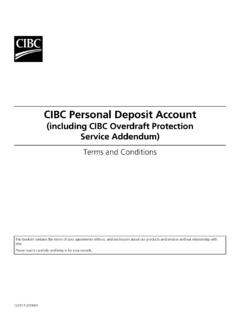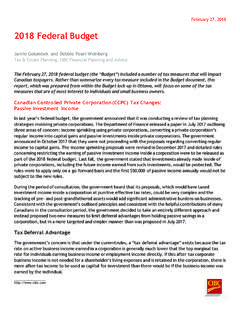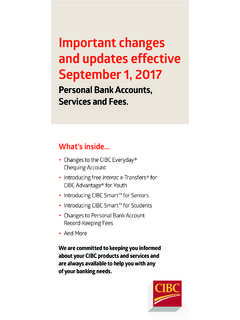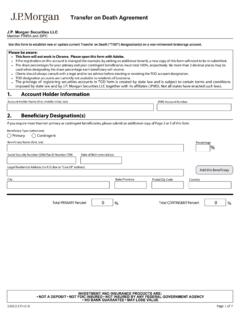Transcription of What happens when a TFSA holder dies? - CIBC
1 what happens when a TFSA holder dies? I 1 what happens when a TFSA holder dies? May 2022 Jamie Golombek Managing Director, Tax and Estate Planning, CIBC Private Wealth The Tax-Free Savings Account (TFSA) was created by the Federal Government to encourage Canadians to save, tax-free, for their future. Despite the reams of advertising and promotion surrounding TFSAs, there is still some confusion about what happens upon the death of the TFSA holder . All provinces, except Quebec, have legislation to permit the holder of any type of TFSA to designate a successor holder or beneficiary on the TFSA. The advantage of designating either a successor holder or beneficiary is that the assets in the TFSA can flow directly to the designated successor or beneficiary without going through the estate.
2 This means potential savings on probate fees. From an income tax perspective, when the holder of a TFSA dies, the fair market value of the TFSA immediately before death is considered to be received tax-free by the holder of the TFSA. The decision to designate either a successor holder or beneficiary on a TFSA doesn't affect the tax treatment upon death, but can have an impact on taxation beyond the date of death. Successor holder : This person can only be your surviving spouse or common -law partner . If you designate your spouse or partner as the successor holder , and assuming they take over the TFSA, it continues growing tax-free and they step into your shoes and become the new TFSA beneficiary : If your spouse or partner is designated as a beneficiary of your TFSA, instead of being designated as a successor holder , they have until Dec.
3 31 of the year following the year of death to contribute any payments received out of your TFSA, up to the date of death value, into their own TFSA without affecting their own unused TFSA contribution room. To complete this exempt contribution , they must file CRA Form RC240 within 30 days after the contribution is made. Even if you don t designate them as successor holder or beneficiary , your spouse or partner may still be able to make an exempt contribution to their own TFSA, to the extent they receive the value of the TFSA proceeds as a consequence of your death. This could be where the TFSA falls to the estate and your spouse or partner receives residue of the estate under your will or on intestacy (if you didn t make a will).
4 The disadvantage here is that all income earned on the TFSA assets, as well as any increase in the fair market value of the TFSA's assets after death, from the date of death until the date the TFSA is paid out to the spouse/partner beneficiary (or Dec. 31 of the year following death, if earlier) will be taxed as ordinary income to the beneficiary . This includes amounts that otherwise may be tax-preferred Canadian dividends or capital gains. That's why it may be best to name your spouse or partner as successor holder instead of as beneficiary or otherwise have them inherit TFSA proceeds. Please note that for individuals domiciled in Quebec, successor holder and beneficiary designations are not accepted in that province on non-insurance TFSAs but the surviving spouse / partner can still make use of the exempt contribution process.
5 Clients should seek legal advice as to how to deal with TFSA assets in their Will. 1 Some financial institutions may require the survivor to open a new TFSA to complete the process. what happens when a TFSA holder dies? I 2 Finally, if you designate someone other than your spouse or partner as the TFSA beneficiary , or you don't (or in Quebec, can t) designate anyone at all and the TFSA proceeds have to be paid to your estate, any income earned on the TFSA assets after the date of death will, in most cases, be taxable to the beneficiary or the estate as ordinary income. A beneficiary who is not your spouse or partner can only contribute proceeds from your TFSA to his or her own TFSA if the beneficiary has sufficient TFSA contribution room.
6 Note that you lose your TFSA contribution room the moment you die there is no provision for your estate representative to make a contribution to your TFSA. Jamie Golombek, CPA, CA, CFP, CLU, TEP is the Managing Director, Tax & Estate Planning with CIBC Private Wealth in Toronto. Disclaimer This report is published by CIBC with information that is believed to be accurate at the time of publishing. CIBC and its subsidiaries and affiliates are not liable for any errors or omissions. This report is intended to provide general information and should not be construed as specific legal, lending, or tax advice. Individual circumstances and current events are critical to sound planning; anyone wishing to act on the information in this report should consult with their financial, tax and legal advisors.
7 The CIBC logo is a trademark of CIBC.













